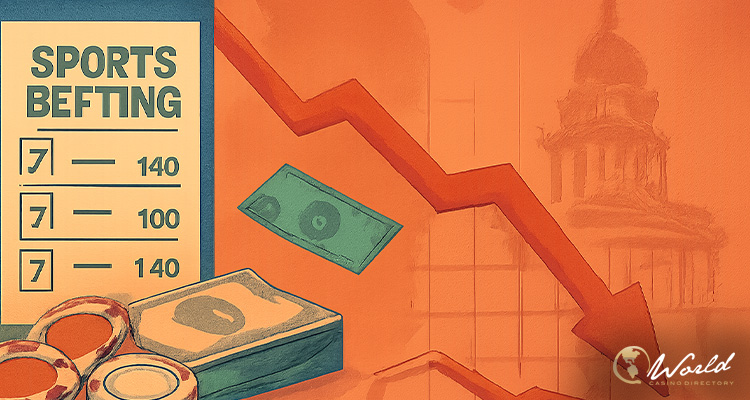The online sports betting industry took a significant hit this week after Illinois lawmakers unexpectedly approved a budget that includes a steep new tax on individual wagers, sending shockwaves through Wall Street and rattling investor confidence. Stocks of major gaming firms tumbled Monday as market leaders scrambled to assess the implications of a late-night legislative move that introduces a first-of-its-kind per-bet tax.
The state’s $55 billion budget package, passed late Saturday night, introduces a 25-cent charge on each of the first 20 million bets made annually per sportsbook. That levy doubles to 50 cents per wager beyond the 20 million mark. Governor J.B. Pritzker has indicated he will sign the measure, which is part of a broader initiative to generate an additional $800 million in revenue.
DraftKings and FanDuel to Shoulder Largest Burden
This move directly targets heavyweights like DraftKings and Flutter’s FanDuel, both of which logged well over 100 million bets each in the past year. Truist Securities analyst Barry Jonas, cited by CNBC, noted that these two companies, which control a combined 82% of Illinois’ betting volume, will “certainly” surpass the 20 million wager threshold, forcing them into the higher tax tier. Based on 2024 figures, Jonas estimates FanDuel and DraftKings could owe an additional $40–$45 million and $35–$40 million, respectively, once the policy kicks in on July 1.
Unsurprisingly, their stock prices took a hit—DraftKings dropped 6%, and Flutter saw a more than 2% decline. Other companies, including MGM Resorts and Penn Entertainment, experienced more modest losses.
Jonas also pointed out that smaller operators such as BetMGM, BetRivers, and Fanatics would face less significant financial strain. For example, BetMGM, which saw only 16 million wagers in the same period, would face an added burden of roughly $4 million under the new rules.
Industry and Analysts Call the Move “Punitive”
Industry groups were swift and vocal in their condemnation. The Sports Betting Alliance (SBA)—which includes FanDuel, DraftKings, BetMGM, and Fanatics—blasted the tax as “discriminatory, punitive and constitutionally suspect.” In a strongly worded statement, the alliance accused lawmakers of pushing small-dollar bettors toward unregulated offshore platforms.
“For the second consecutive year, the Illinois legislature chose to balance its budget with a crippling tax on legal online sports betting operators and their million plus Illinois customers — this time with no warning and no consideration of the devastating impact this tax would have on the legal market,” the SBA declared.
The organization further argued that casual bettors placing wagers as low as $1 would be disproportionately impacted. “These popular bets will get hit with a massive 25% or 50% tax,” the statement noted. “Customers understand that they will be the ones to bear the cost.”
Robert Walker, director of operations at ARMS and a longtime industry veteran, echoed those concerns, saying the policy “sets a dangerous precedent” and is a “short-sighted revenue grab” likely to erode the competitiveness of legal sportsbooks.
Potential Ripple Effects Across the U.S.
Beyond Illinois, financial analysts and policy experts are increasingly concerned that other cash-strapped states might emulate the new tax model. “There’s very much a copycat system,” said Adam Hoffer of the Tax Foundation. He added that the per-wager levy, being the first of its kind, risks distorting the market and discouraging low-stakes recreational betting.
Some on Wall Street worry that the tax will embolden illegal operators and potentially usher in a migration of users away from regulated platforms. “We wonder if the change emboldens illegal market operators, as players may move away from regulated gaming with less attractive/higher tax offerings,” wrote Jonas in a note to investors.
Deutsche Bank’s Carlo Santarelli was even more blunt, labeling the policy “punitive” and warning that when combined with revenue taxes, the effective burden could exceed 60%—a figure he considers unsustainable in a mature market like Illinois, where mobile betting has been available since 2020.
Calls for iGaming Legalization Amid Revenue Pressures
The tax’s unexpected passage left many industry observers wondering why lawmakers didn’t instead pursue the legalization of online casinos, a measure that had been projected to generate up to $800 million annually. The SBA criticized lawmakers for ignoring this option, saying it would have been a more stable and less disruptive way to raise funds.
Jonas also suggested the legalization of iGaming could become the next step, particularly since he sees limited room for further tax hikes without seriously jeopardizing the state’s sports betting ecosystem.
Until then, operators are left grappling with how to absorb the new costs. Proposed strategies include increasing minimum wager amounts, adjusting odds to be more favorable to the house, and even passing the tax directly to consumers through surcharges, though all of these carry risks of alienating customers or shrinking market share.
As one industry analyst noted, “The most striking impact of the new tax is the impact it will/should have on low-dollar-denominated wagers,” a key area for platforms like FanDuel, which rely heavily on multi-leg parlay bets with small initial stakes.


